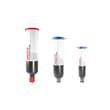LOCTITE ECCOBOND FP4802
- High purity
- Excellent flow
- Phenolic encapsulant
Product Description
LOCTITE® ECCOBOND FP4802 is a high purity, liquid, phenolic encapsulant designed for use in applications utilizing lead-free solder. This low warpage product can withstand solder reflow temperatures up to 260°C after being exposed to JEDEC level 2 (85°C/60% RH, 168hours) preconditioning. It was formulated to meet “Green” non-halide objectives of many technical users and for temperature cycling ranges up to -65 to 150°C.
LOCTITE ECCOBOND FP4802 features excellent flow properties allowing the material to penetrate fine pitch wires and deep cavities without entrapping voids. A cavity or potting dam is required for flow control.
LOCTITE ECCOBOND FP4802 is suitable for bare chip protection of a variety of advanced packages, such as Ball Grid Arrays (BGA’s), Chip Scale Packages (CSP’s), Plastic Ball Grid Arrays (PBGA’s), and full arrays on Low Temperature cofired Ceramic (LTCC).
Cure Schedule
- 60minutes @ 120°C plus 120minutes @ 165°C
- 30minutes @ 125°C plus 90minutes @ 165°C
Do not cure with a ramp rate >10°C/minute.
Technical Specifications
| General Properties | |
| Pot Life Pot Life Pot life is the amount of time it takes for the viscosity of a material to double (or quadruple for lower viscosity materials) in room temperature after a material is mixed. It is closely related to work life but it is not application dependent, less precise and more of a general indication of how fast a system is going to cure. | 8 hours |
| Specific Gravity Specific Gravity Specific gravity (SG) is the ratio of the density of a substance to the density of a reference substance; equivalently, it is the ratio of the mass of a substance to the mass of a reference substance for the same given volume. For liquids, the reference substance is almost always water (1), while for gases, it is air (1.18) at room temperature. Specific gravity is unitless. | 1.76 |
| Thermal Properties | |
| Glass Transition Temperature (Tg) Glass Transition Temperature (Tg) The glass transition temperature for organic adhesives is a temperature region where the polymers change from glassy and brittle to soft and rubbery. Increasing the temperature further continues the softening process as the viscosity drops too. Temperatures between the glass transition temperature and below the decomposition point of the adhesive are the best region for bonding. The glass-transition temperature Tg of a material characterizes the range of temperatures over which this glass transition occurs. | 50 °C |
| Other Properties | |
| MSL Level | MSL 2 |
| Physical Properties | |
| Viscosity Viscosity Viscosity is a measurement of a fluid’s resistance to flow. Viscosity is commonly measured in centiPoise (cP). One cP is defined as the viscosity of water and all other viscosities are derived from this base. MPa is another common unit with a 1:1 conversion to cP. A product like honey would have a much higher viscosity -around 10,000 cPs- compared to water. As a result, honey would flow much slower out of a tipped glass than water would. The viscosity of a material can be decreased with an increase in temperature in order to better suit an application | 80,000 mPa.s |




